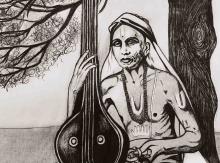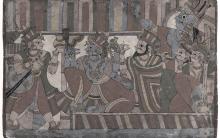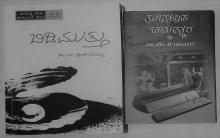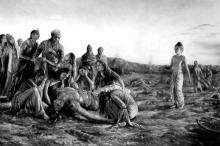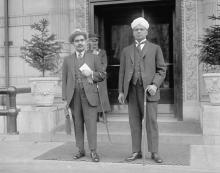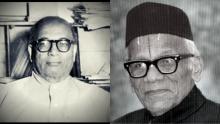It can be surely said that the rejuvenation of modern Kannada literature started during the regime of Krishnaraja Wodeyar III. The mahārāja offered shelter and patronage to several vidvāns (scholars). The scholars in his court—i.e. āsthāna-vidvāns—rendered their service to literature by translating into Kannada great works like Rāmāyaṇa, Mahābhārata, Bhāgavata, and other devotional texts (bhakti sahitya).
Author:hari
Subbanna the Musician
Shri. Subbanna was the music teacher in the girls’ school. During those days, teachers were familiar with a bit of poetry. They were trained enough to at least recognise some of the features/attributes of poetry. When his prowess and enthusiasm was at its peak (1887 C.E.), the golden jubilee of the coronation of Queen Victoria was being celebrated. Probably during that or sometime later, to suit the situation, he composed the following song. He used to teach this for many more years to come.
ಕ್ವೀನ್ ವಿಕ್ಟೋರಿಯಾ
বাগ্মিতা, সততা, বুদ্ধিমত্তা, বৈদগ্ধ্য অথবা প্রত্যুতপন্নমতিত্ব – একজন প্রকৃত কূটনীতিজ্ঞের সকল গুণই কৃষ্ণের মধ্যে উপস্থিত ছিল। তাঁকে একজন মৃদুভাষী রূপে কল্পনা করা যায়। তাঁর বাণী একাধারে সৎ এবং চিত্তগ্রাহী (ভ. গী. ১৭.১৫)। তাঁর বাণী কখনও ভ্রান্ত নয়, বরং অতি বাস্তবিক। তিনি কখনও প্রতিজ্ঞাবিস্মৃত হননি, কখনও প্রতিজ্ঞাভঙ্গ করেননি। আবার, ধর্মরক্ষার্থে শত প্রতিজ্ঞা পরিত্যাগ করতেও পিছপা নন। কৃষ্ণের ‘ধর্মদৃষ্টি’-তেই (সামগ্রিক সদগুণ উপলব্ধি করার দূরদর্শিতা) গীতা পরিপূর্ণ।
Yudhiṣṭhira asked, “How did this universe, with animate and inanimate, get created? When it dissolves, where does it go?”
ಇನ್ನು ಮುಂದೆ ಸುಭಾಷಿತಚಮತ್ಕಾರದ ಕೆಲವೊಂದು ಅನುವಾದಗಳನ್ನು ಪರಿಶೀಲಿಸೋಣ.
ಮರ್ಕಟಸ್ಯ ಸುರಾಪಾನಂ ಮಧ್ಯೇ ವೃಷ್ಚಿಕದಂಶನಮ್ |
ತನ್ಮಧ್ಯೇ ಭೂತಸಂಚಾರೋ ಯದ್ವಾ ತದ್ವಾ ಭವಿಷ್ಯತಿ ||
ಮಂಗ ಸೆರೆಯ ಕುಡಿಯಿತು,
ಮೇಲೆ ಚೇಳು ಕಡಿಯುತು,
ಮತ್ತೆ ಭೂತ ಬಡಿಯಿತು,
ಏನಕೇನೊ ಆಯಿತು (ಸು.ಚ., ಪುಟ ೯೮)
ಯುದ್ಧಾರಂಭವಾದ ಮೇಲೆ, ತನ್ನ ಹನ್ನೊಂದು ಅಕ್ಷೋಹಿಣಿ ಸೈನ್ಯ, ಭೀಷ್ಮ, ದ್ರೋಣ, ಕರ್ಣ ಮಹಾವೀರರ ನೆರವಿನಿಂದ ಜಯದ ಭರವಸೆ ಹೊತ್ತಿದ್ದ ದುರ್ಯೋಧನ, ತನ್ನ ತಮ್ಮಂದಿರನ್ನೂ, ಮಕ್ಕಳನ್ನೂ, ಮಿತ್ರರನ್ನು ಕಳೆದುಕೊಂಡ ಮೇಲೆ ಛಲವನ್ನು ಬಿಡುವುದಾಗಲೀ, ಈ ಭೂಮಿಯ ಮೇಲೆ ಬದುಕುವುದಾಗಲೀ ಅರ್ಥಹೀನವೆನಿಸುತ್ತದೆ ಅವನಿಗೆ. ಹಾಗಾಗಿ ಕಡೆತನಕ ಹಗೆತನದ ಕವಚ ತೊಟ್ಟೇ ಬದುಕಿ ವೈಶಂಪಾಯನ ಕೊಳದ ಬಳಿ ಭೀಮನಿಂದ ಹತನಾಗುವ ದುರಂತನಾಯಕನಾಗುತ್ತಾನೆ.
ರಣಮುಖದೊಳೀ ಕ್ಷತ್ರಧರ್ಮದ
ಕುಣಿಕೆ ತಪ್ಪದೆ ವೇದಶಾಸ್ತ್ರದ
ಭಣಿತೆ ನೋಯದೆ ವೀರ ವೃತ್ತಿಯ ಪದದ ಪಾಡರಿದು |
ಸೆಣಸು ಸೋಂಕಿದ ಛಲದ ವಾಸಿಯೊ-
ಳಣುವ ಹಿಂಗದೆ ಜೀವದಾಸೆಗೆ
ಮಣಿಯದಳಿದುದನೆಲ್ಲ ಬಲ್ಲರು ಕೃಷ್ಣ ಕೇಳೆಂದ || (ಗದಾಪರ್ವ 08.41)
Meetings and Hospitality
Every evening about seven to eight of us met at Srinivasa Sastri's house in Bangalore. Dr. B K Narayana Rao, M S Ramachandra Rao, N N Iyengar, S G Shastri, Prof. Sampath Kumaran and other were aomong those who regularly came for such get-togethers. We were also accompanied by Judge Srinivasa Iyer and D Venkataramayya at times. We had friendly conversations for about an hour or two. Dewan Sir Mirza Ismail and Sir S P Rajagopalacharya visited the place often.
உபநயனத்திற்கான ஏற்பாடுகள்[1]
உபநயனம் நடைபெற ஒரு śālā (விதானம், கூடாரம்) அமைக்கப்படுகிறது.[2]
உபநயனத்துக்கு முன் புராண நிகழ்ச்சிகள் சில நடைபெறுகின்றன. விநாயகனை வணங்கியபின், ஸ்ரீ, லக்ஷ்மி, திருதி (Dhṛtī), மேதா, புஷ்டி, ஸ்ரத்தா (Śraddhā), மற்றும் சரஸ்வதி முதலான தேவிமார்களை வழிபடுகிறார்கள்.[3] பொதுவாக, இதோடுகூட உதக சாந்தி மந்திரங்களும் ஓதப்படுகின்றன.


